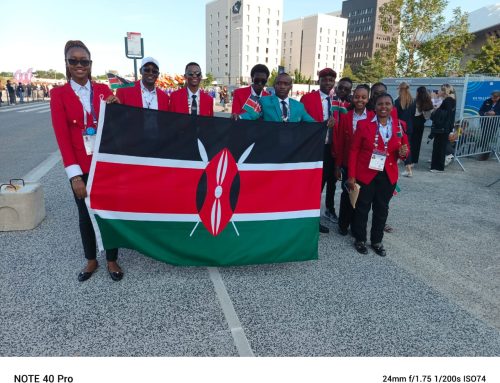The Principal Secretary in State Department for Vocational and Technical Training (VTT) Dr Margaret Mwakima today witnessed the handover of ICT equipment to six TVET colleges at a function held at PC Kinyanjui TTI.
Speaking at the ceremony, the PS lauded UNESCO and the Republic of Korea for spearheading the BEAR II Better Education for Africa’s Rise (BEAR II) project that is geared to improve the TVET systems in five countries of Eastern Africa including Kenya over 2017-2021 period. She noted that the digital transformation of TVET in the country will be undertaken with the involvement of all the right stakeholders, ranging from all levels of the economy.
“As a Department, we have plans on the digital transformation of TVET of which various actors and factors are being looked at, which shall come out in form of a Master Plan. Strong leadership to guide the entire process of transformation and collaborations between a cross-section of stakeholders is also required,” the PS said.
The function was attended by the Ambassador for the Republic of South Korea in Kenya Hon. Yeonghan Choi, the Director of UNESCO’s Regional for Eastern Africa Prof. Hubert Gijsen, TVET Authority Director-General Dr Kipkorir Langat, Secretary-General, Kenya National Commission for UNESCO, Dr Evangeline Njoka, BEAR II Regional Coordinator, Mame Mor Diarra Ndiaye, among other guests.
The PS Dr Mwakime said that Bear II Project has supplied ICT equipment which includes Computers, interactive boards, projectors and other devices to 6 beneficiary institutions within Kenya.
The benefitting institutions include; Wote Technical Training Institute, Kaiboi Technical Training Institute, Coast Institute of Technology, PC Kinyanjui Technical Training Institute, Siaya Institute of Science and Technology, and Michuki Technical and Training Institute
“These institutions will be rolling out the implementation of solar PV curricula (Level 6 and Level 3) during the course of the year. The ICT equipment is expected to provide platforms for providing digital learning and hence increasing accessibility and improves the attractiveness of TVET Training,” she said.
She reminded the beneficiary institutions that the equipment are meant to help the Kenyan youths now and in the future.
“In this regard, we advised that you prepare to receive the equipment prepare and update inventories and communicate accordingly, in respect to laws guiding on the public assets. Institutions are accountable to assets and equipment that are received on behalf of Kenyans.”
TVET Authority Director-General Dr Kipkirui Langat said the Authority has been spearheading the Strategic Plan for TVET 2019-2023, which aims at achieving a modern and labour-market responsive TVET system in the country.
“The TVET Act No. 29 of 2013 places a premium on quality CBET programmes offered in Kenya to ensure a strong link between skills learnt and the needs of the labour market,” Dr Langat said.
He said BEAR II has achieved a lot since the project started in 2017. This includes the development of the Labour Market Analysis model, development of the Solar PV Curricula (Levels 3 and 6), the capacity building of trainers and the private sector framework for supporting skills development in Kenya produced, among the many outputs.
The DG said that between July and December 2021, the project intends to digitalise and implement the TVET training curricula, among other outputs.
The ambassador for the Republic of Korea, H.E. Yeonghan Choi said that TVET education provides the best opportunity, especially for youth as it also provides labour forces for the private manufacturing industry.
UNESCO Regional Office for Eastern Africa, Prof. Hubert Gijzen said that effective partnerships are crucial to make the project work.
He said UNESCO and other partners will continue partnering with the government of Kenya to strengthen TVET systems in the country, especially in the area of relevance, quality of training TVET education and improving the perception of TVET amongst the youth.
BEAR II is an ongoing project, supported by a joint effort between UNESCO and the Republic of Korea. The project targets improving the relevancy of TVET to the needs of the economy enhance the quality of TVET delivered to trainees and improve the perception of TVET among young people and society.
In Kenya, the overall objective of the project is to support national authorities together with the private sector to improve the relevance, quality and perception of TVET. The project specifically aims to enhance TVET system capacity and increase collaboration with the private sector to ensure the employability of student graduates from TVET programmes in the Environment Sector.
The project implementation is at its final stages having manoeuvred through the season and effects of the CVID-19 pandemic.


